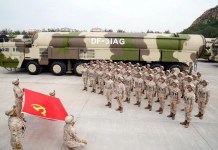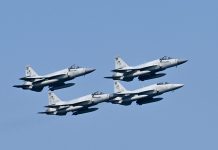US Secretary Antony Blinken, Secretary of Defense Lloyd Austin, and NATO Secretary-General Jens Stoltenberg held a Joint Press Conference where they discussed Afghanistan.
Blinken said – It’s very good to be back here at NATO just a few weeks after my first visit as Secretary of State, particularly for such an important day in the history of our alliance.
Blinken further said – Twenty years ago, after the United States was attacked on 9/11, this alliance invoked Article 5 for the first time in its history. An attack on one is an attack on all. Together, we went to Afghanistan to root out al-Qaida and prevent future terrorist attacks from Afghanistan directed at our homelands. Now, we will leave Afghanistan together and bring our troops home.
President Biden just laid out our plan in detail in a speech to the American people.
And as you heard and as Jens just noted, we’ll begin our troop withdrawal by May 1st and we’ll complete it before the 20th anniversary of 9/11 later this year.
After years of saying that we will leave at some point, that time has come. The threat from al-Qaida in Afghanistan is significantly degraded. Osama bin Laden has been brought to justice. We have achieved our original objective.

And we don’t believe that maintaining an indefinite troop presence in Afghanistan is in our interests – not for the United States, not for NATO and our allies. The world has changed dramatically over the last 20 years, and as you heard the President say, we have to adjust our strategy to meet the threats of 2021, not 2001, and take on the challenges that now demand our focus and resources.
The United States and our allies will coordinate closely on our next steps. We have always said, as the secretary-general noted, that our plan was “in together, adjust together, out together.” And today, we began to hammer out what “out together” looks like. We will withdraw our troops responsibly, deliberately, safely.
Let me be clear: Even with our troops home, we as an alliance and the United States as a country will continue to invest in and support the Afghan people and their chosen leaders.
We’ll also remain vigilant against any possibility that the threat of terrorism re-emerges in Afghanistan. We’ll reorganize our counterterrorism capabilities to stay on top of that. We’ll also hold the Taliban accountable to its commitments to keep al-Qaida or any terrorist organization from using Afghanistan as a base for attacks against us.
We’ll pursue a durable and just political settlement between the Government of Afghanistan and the Taliban. And we’ll engage other countries that have a major stake in a stable future for Afghanistan and will now have to step up after years of NATO underwriting stability.
We’ll continue to support the Government of Afghanistan and provide assistance to the Afghan Security Forces who have fought and continue to fight valiantly and at great cost on behalf of their country.
And we’ll keep investing in the well-being of the Afghan people. We’ll bring our diplomatic and development resources to bear to protect and build upon the gains that the Afghan people have made in recent years. We’ll continue support for the rights of Afghan women and girls, minorities advocating for their meaningful participation in the ongoing negotiations and their equal representation throughout society, and we’ll maintain significant humanitarian assistance to those in need.
In short, bringing our troops home does not mean ending our relationship with Afghanistan or our support for the country. And as Jens said, this will be the start of a new chapter grounded in diplomacy – just like our relationships with other countries. The future of Afghanistan ultimately is in the hands of the Afghan people, where it belongs. But our support, our engagement, and our determination remain.
Let me just also take a moment to acknowledge the extraordinary courage and strength of the troops who have served in Afghanistan over the past 20 years. At its height, the International Security Assistance Force had troops from 50 NATO and partner countries.
Today, Resolute Support has troops from 35 NATO Allies and partners. Our service members risked their lives, lost their lives in this effort, but we have succeeded in achieving the objective that we set out to achieve thanks to them, and we honor their service and their sacrifice.
I also have to say that the United States will never forget the solidarity that our NATO Allies have shown every step of the way. No country could have achieved what we achieved as an Alliance working together. And as my friend Secretary Austin can attest, these years in Afghanistan have transformed our troops and our countries in ways that we will be reflecting and acting on for a long time to come.
On a separate note, as the Secretary-General said, we also spent some time today talking about the deep concern that Allies share about Russia and its actions on the borders of Ukraine, the largest concentration of forces there since 2014. And what was striking to me was, in the North Atlantic Council meeting, listening to every single ally, all 30 of us, express those concerns and a determination to see Russia take steps to de-escalate the tensions that it is creating.
Our conversations today here at NATO are just the start of the intensive planning that our countries will do together over the next several months. We are grateful to our Allies; we’re grateful to you, Mr. Secretary General, for your leadership, as we undertake this historic transition together.




